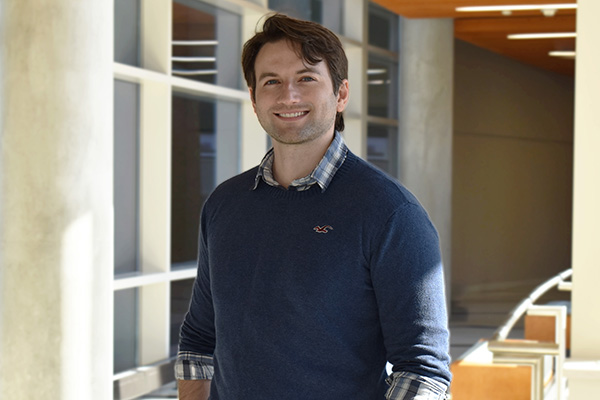Transforming innovations into products is something that the Department of Medical Physics knows well.
Since its very beginning, medical physics faculty have launched dozens of startup companies, many of which are thriving today. This passion for entrepreneurship has formally expanded in recent years to include the next generation of medical physics leaders through its Entrepreneurial Fellowship Program (EFP).
Now in its second year, the Entrepreneurial Fellowship Program invests in senior PhD students or postdocs and provides them with focused mentoring and entrepreneurial training on how best to use the vast resources available through the university and the larger Madison community.

This year, the Department of Medical Physics has selected Thomas Lilieholm, PhD, as its newest fellow. Thomas earned a bachelor’s degree in physics and a minor in business at the University of Texas at Austin. He then completed a master’s and PhD in medical physics at the University of Wisconsin–Madison.
Thomas will be working with several university faculty as a founding member of a startup company that develops specialized hardware and software solutions for image-guided neurosurgeries, making complex procedures simpler and faster.
“I’m passionate about implementing medical research- getting these novel treatments to the people who need them. Entrepreneurship is the most direct path to make this happen,” says Thomas. “Through the EFP, I’ll have access to experienced mentors and support as I develop the necessary skills. In academia, it can be hard to learn practical business principles without dedicated programs like this one.”
For Thomas, his interest in entrepreneurship began several years ago. During his graduate studies, he was a consultant in the student-run business consulting group WiSolve and a recipient of the UW Biotechnology Training Program (BTP) grant, a long-running, NIH-funded program that supports pre-doctoral students in biological, physical, and engineering sciences. In addition, as part of his work in image-guided surgeries, Thomas also joined the Department of Radiology’s interventional MRI team to assist in over 30 MRI-guided prostate cancer biopsies and cryoablations.
In summer 2022, he also interned with a medical technology startup, where he built AI models to automatically identify and segment over 70 different organs in CT scans of the head, neck, and pelvis. These AI segmentations significantly reduce some of the tedious but crucial tasks involved in creating radiotherapy treatment plans for cancers. After completing his internship, Thomas continued working part time with the company for the remainder of his graduate studies.
“Thomas has demonstrated considerable success in interventional radiology at UW–Madison as a seminal team member of Dr. Erica Knavel Koepsel’s prostate cancer cryoablation service and in image-guidance of new minimally invasive neurosurgical techniques,” says Professor Walter Block. “The Entrepreneurial Fellowship Program will turbocharge his career progression by giving him direct access to Wisconsin’s wide ecosystem in image-guided therapy.”
For questions, contact Catherine Showers – cnshowers@wisc.edu.